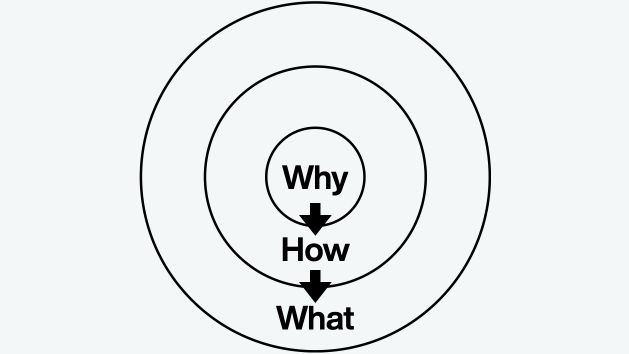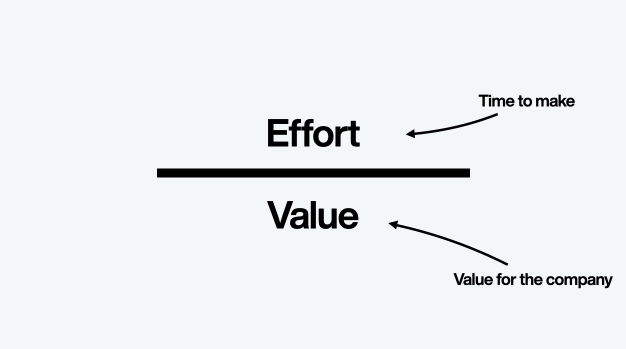Most of us, in the early years of our carreers focus on making code that we can be proud of. Clean code. Elegant code. Smart code.
I used to spend hours trying to make my code do smart stuff, avoiding repetition at all cost with factorisation, writing abstractions all over the place, making sure that I wrote the shortest snippet possible for a given task.
I don't give a f**k about that anymore. At all.
I came to a small mantra:
Write dumb code.
why → how → what
I really like Simon Sinek's «Start with why» TED talk (you've probably already seen it), and while it speaks about companies, I think that the general idea is applicable to a lot of fields.
To paraphrase a little: start from the vision, then figure out how to make it happen, then do it.

Of course Sinek talks about a general principle, but in our case it also works in the small.
why
Knowing the why is what makes us understand from the start what value we're expected to bring. The why is our guideline, what we aim for. When knowing the why, even if we get stuck on the technical part, it gives us the opportunity to find alternative ways to provide a similar value.
how
Once we know why we'll do something, we can focus on the how. How are we going to make that happen? How will it work? How will our feature, our project, our fix, fit in the project? How does solution one compares to solution two?
what
When you've planned how, the what is the least interesting part. It is a translation job. We write in one language what we've expressed in another.
Doing things in that order is beneficial in many ways to the organisation and the people in it:
- people get to know the value that they'll bring from the start
- with the goal in mind, they'll be able to have better ideas
- it eliminates "bad" ideas early in the process
Our job isn't about code
What I consider to be a good developer isn't someone who'll be able to write the most efficient single-line snippet, but someone who is good at getting from why to how, and simply happens to make the what.
To get there, I think that at some point we all need to stop caring about beautiful code. In that sense, normalisation tools like Prettier were in my opinion one of the biggest leaps that we've made in the recent years, because they enabled us not to focus our energy on what by-products.
Our job is about turning a vision into a reality.
Code isn't an end in itself. That's why I strongly believe in dumb code.
What's "dumb code"?
What I call dumb code is code that's:
- easy to read: so that your teammates (or future you) can get it simply
- explicit: it doesn't matter if your variable or function name is super-long. Don't put in a comment what you can put in a name.
- honest: do not hide business complexity to fake simplicity. The only thing you'll accomplish is making people go to more places to grasp the ideas.
- deletable: so that you don't get to the situation where nobody dares touching a piece of the program, not knowing if it'll break something
To take a trivial example: in our front-end React codebase at BeOp, we do what's called props-drilling, which means that we pass down all the data from the root components down through props. I used to find that ugly. Today, some folks would still fight against that, arguing that it doesn't look clean, that we'd better use a separate data store.
Sure. It's dumb.
It's the dumbest way to pass data from a component to its descendants. That's also the simplest. Anyone who's worked on a React codebase knows how to pass a prop to a component. Anyone who reads a component source knows exactly what data it needs in seconds. If we used a data store, that person would probably need to go back and forth between 3 or 4 files just to figure out what happens.
When you write smart code, the most likely person you'll outsmart is your future self, when coming back to that very clever piece of code that you don't remember and that you'll spend a few hours figuring out.
If a piece of code that you don't find perfect brings immediate value to your product, why wouldn't you add it?

Dumb code mecanically reduces the immediate and later effort, making the value that you're able to bring more accessible.
If we were code writing machines, we wouldn't bring much to the table.
We're good when we take a step back and get the big picture.
Write dumb code.
